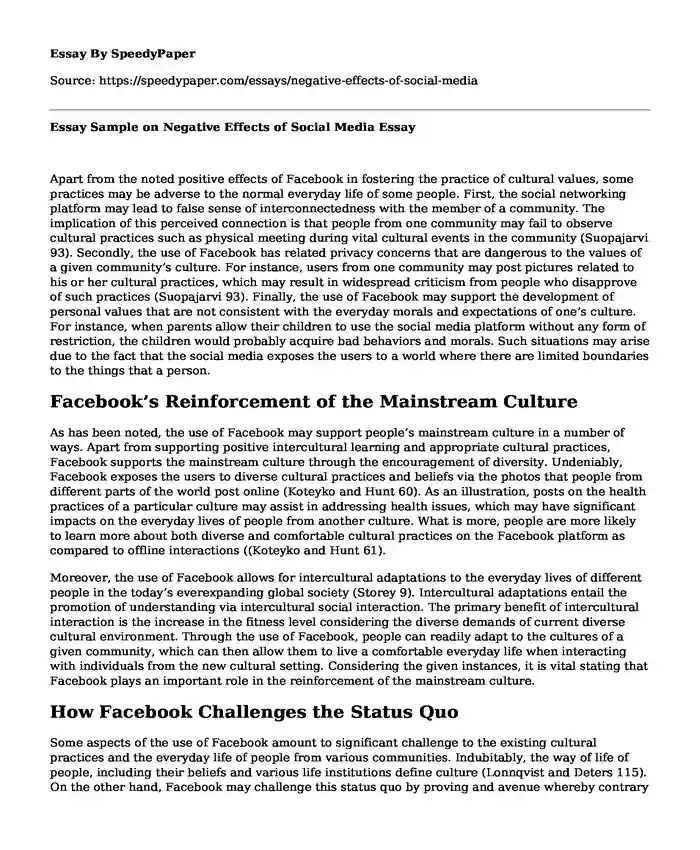
| Type of paper: | Essay |
| Categories: | Facebook Social networks |
| Pages: | 3 |
| Wordcount: | 795 words |
Apart from the noted positive effects of Facebook in fostering the practice of cultural values, some practices may be adverse to the normal everyday life of some people. First, the social networking platform may lead to false sense of interconnectedness with the member of a community. The implication of this perceived connection is that people from one community may fail to observe cultural practices such as physical meeting during vital cultural events in the community (Suopajarvi 93). Secondly, the use of Facebook has related privacy concerns that are dangerous to the values of a given community’s culture. For instance, users from one community may post pictures related to his or her cultural practices, which may result in widespread criticism from people who disapprove of such practices (Suopajarvi 93). Finally, the use of Facebook may support the development of personal values that are not consistent with the everyday morals and expectations of one’s culture. For instance, when parents allow their children to use the social media platform without any form of restriction, the children would probably acquire bad behaviors and morals. Such situations may arise due to the fact that the social media exposes the users to a world where there are limited boundaries to the things that a person.
Facebook’s Reinforcement of the Mainstream Culture
As has been noted, the use of Facebook may support people’s mainstream culture in a number of ways. Apart from supporting positive intercultural learning and appropriate cultural practices, Facebook supports the mainstream culture through the encouragement of diversity. Undeniably, Facebook exposes the users to diverse cultural practices and beliefs via the photos that people from different parts of the world post online (Koteyko and Hunt 60). As an illustration, posts on the health practices of a particular culture may assist in addressing health issues, which may have significant impacts on the everyday lives of people from another culture. What is more, people are more likely to learn more about both diverse and comfortable cultural practices on the Facebook platform as compared to offline interactions ((Koteyko and Hunt 61).
Moreover, the use of Facebook allows for intercultural adaptations to the everyday lives of different people in the today’s everexpanding global society (Storey 9). Intercultural adaptations entail the promotion of understanding via intercultural social interaction. The primary benefit of intercultural interaction is the increase in the fitness level considering the diverse demands of current diverse cultural environment. Through the use of Facebook, people can readily adapt to the cultures of a given community, which can then allow them to live a comfortable everyday life when interacting with individuals from the new cultural setting. Considering the given instances, it is vital stating that Facebook plays an important role in the reinforcement of the mainstream culture.
How Facebook Challenges the Status Quo
Some aspects of the use of Facebook amount to significant challenge to the existing cultural practices and the everyday life of people from various communities. Indubitably, the way of life of people, including their beliefs and various life institutions define culture (Lonnqvist and Deters 115). On the other hand, Facebook may challenge this status quo by proving and avenue whereby contrary practices to the communally accepted values are practiced. For instance, music and videos that encourage violence and crime could be widely shared and popularized via Facebook (Sin and Kim 110). Such cases may negatively affect children’s perspective about life and they are likely to be violent and out of control if no early intervene takes place. Additionally, the social media such as Facebook may challenge the status quo of a community’s culture and way of life when the platforms are used for displaying messages of hate. For instance, some advert materials may have messages that encourage prejudices along the lines of race, ethnicity, culture, and gender (Orosz, Toth-Kiraly, and Bothe 96). For that reason, the use of Facebook may sometimes have adverse effects on the culture and everyday way of life a community.
Conclusion
To be brief, the cultural practices of virtually every community across the globe are influenced by Facebook and, in turn, Facebook nowadays determines how some people practice their culture on a daily basis. As a social networking site, Facebook provides a platform that can be used appropriately to reinforce the mainstream culture. Cultural practices influence the information that people from one culture would be willing to share online. Intercultural adaptations and appreciations are some of the benefits that a culture can accrue from the right use of Facebook and other new social networking sites. On the other hand, an inappropriate use of Facebook may present significant challenges to the status quo of a community’s culture and way of life through the instigation of violence, hate, and moral degradation.
Cite this page
Essay Sample on Negative Effects of Social Media. (2017, Dec 06). Retrieved from https://speedypaper.net/essays/negative-effects-of-social-media
Request Removal
If you are the original author of this essay and no longer wish to have it published on the SpeedyPaper website, please click below to request its removal:
- Essay Example on Trend Analysis - The Internet of Sharing Things
- Essay Example with Analysis and Evaluation of the Community Agency Observation
- American Revolution vs. French Revolution - Comparison Essay Example
- Free Essay Focusing on the Healthcare Barriers in Diverse Populations
- Ethical Loyalty - Case Study Paper Sample
- Free Essay Example: Importance of Responsibility in Military
- Essay Sample on Technology Effect on Healthcare
Popular categories




